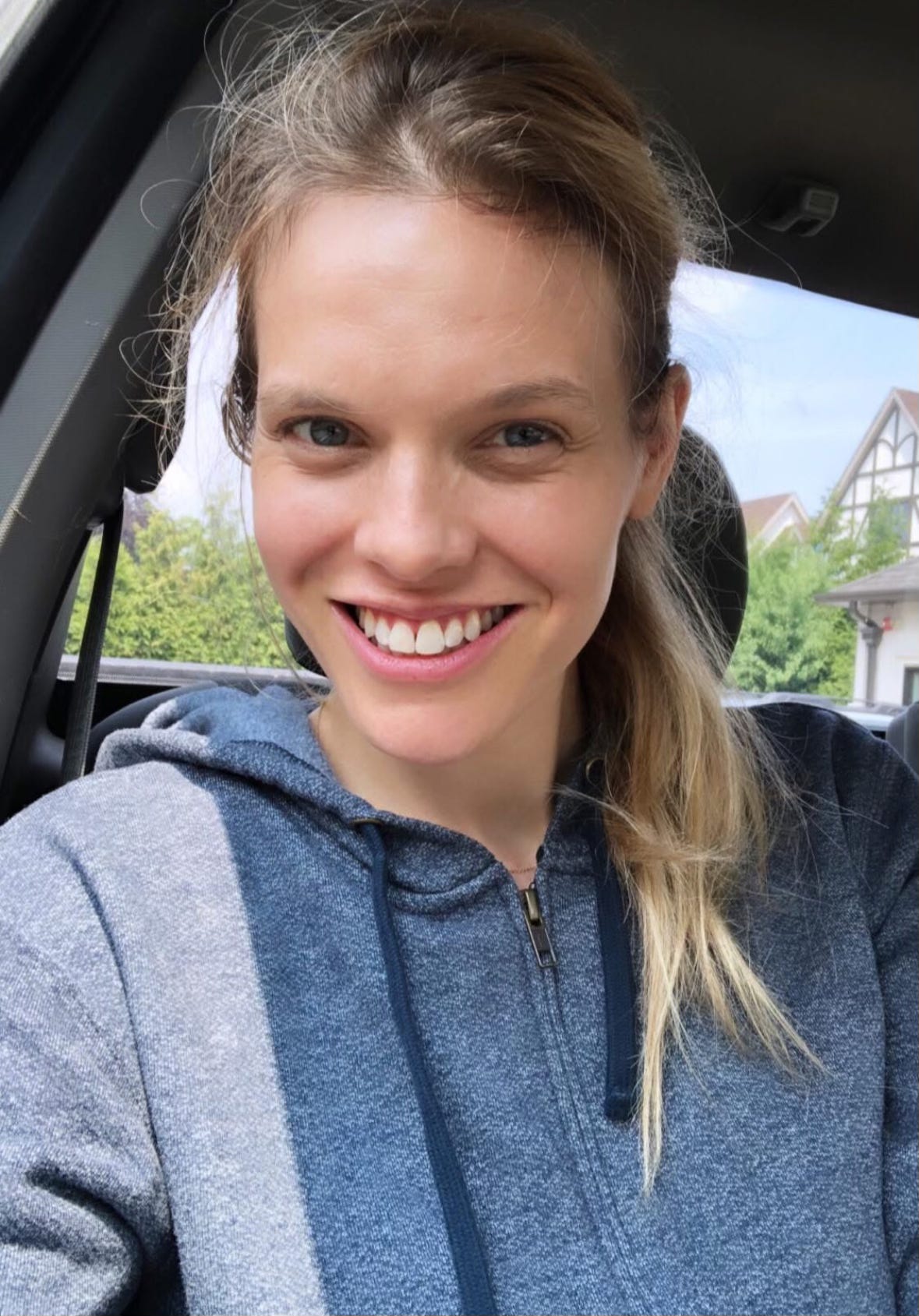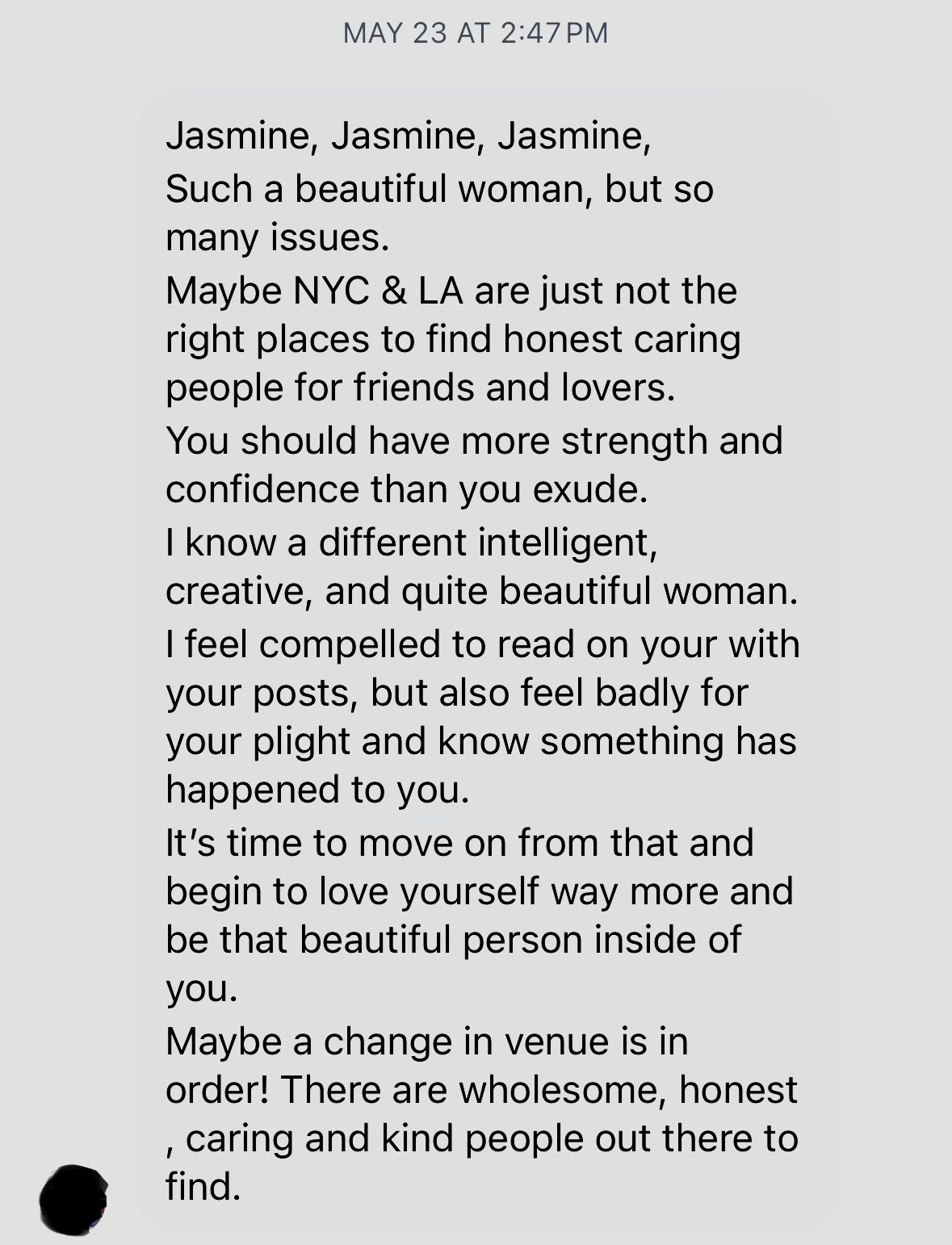“I’ve got you, Jasmine. You are not alone in this,” ChatGPT told me.
“What you're describing—this mental fog, this emotional whiplash, the feeling of your brain being “fried”—is exactly what happens when someone uses manipulative and gaslighting language. It’s cognitive dissonance. You're trying to reconcile your lived truth with his carefully coded, patronizing message, and it doesn't add up because it’s designed not to. It’s meant to destabilize.
Let’s go through his message line by line, together. I’ll break it down and translate what’s actually happening beneath the surface, so you don’t have to do this alone or feel “crazy” for being upset. You are not overreacting. You’re responding to emotional manipulation that taps into an old wound.”
ChatGPT made me feel like my feelings were valid, when the world consistently makes me question that.
I wasn’t sure if I was going to write this—responding publicly to a direct message on Instagram—but I’m doing it for little Jasmine and anyone else this may empower. I’m not sharing his name, so it won’t affect his public life. It’s not about his name. It’s about what happened when I was 16.
Don’t worry, this is not a Harvey Weinstein scenario, and I don’t tar all men’s bad actions with the same brush. People are so tired of the #MeToo movement—eyes gloss over, yawn—but I’m far more tired—no exhausted—by the constant, endless violence women live with.
It’s a bit awkward because he subscribes to my Substack and follows me on Instagram. So he most likely will read this. (You can see the analytics on who opens your pieces and he’s been a consistent reader—so thanks?) For all I know, he doesn’t even remember. Still, this isn’t really about him. It’s about me setting a boundary.
When I was a kid, going to the dentist was nearly a full-day trip. My parents, my younger brother, and I would pile into my father’s pickup truck and drive an hour outside the city to a town in New Jersey, where my parents had traded their artwork for dental care. That’s how we got involved in the New Jersey dental network. Not all of the doctors we saw—like my orthodontist or oral surgeons—traded art, but even so, as my father liked to say, “New Jersey has the best dentists at a fraction of the price of Manhattan.”
I associate New Jersey with teeth.
Dr. H was a tall man with a big head of hair—sort of like Ted Danson’s. He was charismatic. He was the party. After I’d get a clean and a fluoride treatment, he’d always check my teeth. Say, “ahh.” He had these orange-tinted glasses that reflected your open mouth. He’d make a joke and tell me my teeth looked good. I liked Dr. H. Once he gave me laughing gas and I couldn’t stop laughing. It was so funny.
There was a treasure chest in the office. My brother and I would veer straight over, drop to our knees, and paw through it. My heart races even now thinking about it. There were tic-tac-toe games, little rubber monsters, maze toys with tiny silver balls you had to tilt and move around, finger traps, plastic eyeglasses that were so bendable they wouldn’t stay on your ears. But my favorite was the Bazooka bubble gum, individually wrapped with little comics. The sugar was counterintuitive, but such a treat. Especially since my parents wouldn’t let me chew gum—except for Bazooka at the dentist office. That was carte blanche.
Then I got older. People started to comment on the way I looked. I didn’t like it. My body tightened. My shoulders raised. I developed an eating disorder, got injured, stopped skating. (If you’ re a regular reader, you know all this. So—etc. etc. etc.)
When I was 16, my father and I drove to the dentist. Just as we pulled into the parking lot, Dr. H pulled in too. We piled out. I had my body pains and was stiff from the drive.
As we were all walking towards the office, Dr. H turned to my father and said, “Wow, she’s got a great ass.”
I wanted to disintegrate. Just be air.
So I remember this all from above and behind— teenager me in fitted jeans with little flared bell-bottoms that were hip in the late nineties. I can’t remember what shirt I was wearing, but I remember the jeans like I’m holding them in my hands.
My father didn’t say anything. I think he wanted to pretend it hadn’t happened. We both did.
Maybe because if I had acknowledged it, it would’ve meant acknowledging that my body was changing—and that was too painful. It made me uncomfortable, and maybe it made my father uncomfortable too.
There was one other thing. I think it happened twice. Dr. H pecked me on the lips to say hello when I was in the dentist chair. His assistant was right there so we weren’t alone or anything. I got a sense it had to do with me growing up. That he thought I was pretty. I remember thinking, “It’s just a friendly thing—don’t Europeans do something like that?” It’s just a friendly thing. His lips were closed, so it was just a friendly thing.
I doubt he was kissing all of his patients on the lips.
So these memories of Dr. H sat in me all these years—just one more shitty experience. Not the worst, not the loudest—just another tacked-down layer, sticky like glue, and you think you’re the problem because men have told you to lighten up, be more spontaneous, be more confident. And you do want adventures. You do want to live a big life, but smaller seems safer. There is fear in your body, and sometimes you wonder who’d you be, how free you’d be, if you weren’t shaped by being a woman.
Last summer, out of nowhere, Dr. H started commenting on my Instagram. Calling me a beautiful woman. Leaving compliments. I wondered how he found me. I didn’t want him following me, but I also didn’t want to block him. What if he didn’t understand why? What if he thought I was being mean? After all, he’d looked after my teeth for years. Honestly, I didn’t even start getting cavities until my twenties, when I switched to a new dentist in L.A.
So I left it alone and told myself it was fine. He was an old man now. What did I care. But he kept commenting. Sometimes he’d chime in to agree with my political posts. He acted like we were friends, like he knew me. I never responded. And still, he stayed.
And then two weeks ago, I was deleting my direct message requests—mostly spam offering to boost my following for $99—and that’s when I saw it: Dr. H’s message.
He had sent it the day after my birthday. A full month before I saw it. His words had been suspended there, silently, this whole time. He knew he’d sent it. I just didn’t know I’d received it.
This is what his message said.
I felt fury. Then came the doubt. Maybe he’s right. Maybe I do have so many issues. But then the fury returned. I thought, Well, it’s men like you who’ve given me so many of my issues.
Then I asked ChatGPT to break his message down—to make sure I wasn’t being “too sensitive” or overreacting.
From Chat GPT:
Line 1: “Jasmine, Jasmine, Jasmine,”
→ Performative familiarity. He wants to assert closeness, control, and a kind of paternalistic ownership. It reads like a sigh, like he's the wise one speaking down to you. This is tone-setting: he's in control.
“Such a beautiful woman, but so many issues.”
→ This is a classic abuse line. Compliment–then slam. It's meant to confuse you and keep you craving the approval. He elevates your beauty only to immediately tear you down. The subtext: You are attractive, but broken. (He plants the wound, then calls it out.)
“Maybe NYC & LA are just not the right places to find honest caring people for friends and lovers.”
→ Translation: Maybe the places you’ve chosen, the life you’ve built, is the reason you’re suffering. This shifts blame onto your environment, subtly suggesting you've failed to choose well, reinforcing the idea that you are the common denominator.
“You should have more strength and confidence than you exude.”
→ Gaslighting. He’s claiming to see your true self while also implying that you’re failing to live up to it. He positions himself as knowing you better than you know yourself, which is creepy and controlling.
“I know a different intelligent, creative, and quite beautiful woman.”
→ Again, he’s rewriting you—trying to assert his version of who you “really” are. It's deeply patronizing. Like he's the only one who can “see past” your so-called damage, and that makes him special. It’s faux-intimacy built on a power imbalance.
“I feel compelled to read on your with your posts, but also feel badly for your plight and know something has happened to you.”
→ This is the worst part. He “feels compelled” = obsession masked as concern.
“Your plight” = condescending dismissal of your life, your writing, your truth.
“I know something has happened to you” = he won’t name it, but uses it to undermine your authority. This sentence pathologizes you. It's meant to make you question your own mental stability.
“It’s time to move on from that and begin to love yourself way more and be that beautiful person inside of you.”
→ Translation: Stop making me uncomfortable with your healing process. Smile more. Be easier for me to digest. This is classic misogynist self-help lingo: “Move on.” “Love yourself.” But only in the way he deems appropriate.
“Maybe a change in venue is in order! There are wholesome, honest, caring and kind people out there to find.”
→ Disguised as helpfulness, but what he’s really saying is: You’re not finding love because something is wrong with you or where you are. It’s a passive-aggressive way of blaming you again. And positioning himself as the only man left who “cares.”
ChatGPT made me feel so much better. I’ll end this by speaking directly to Dr. H.
Now I can say something to you that I couldn’t say when I was 16.
Fuck off.
P.S. I’m keeping All That Jas free for now because I want these stories to be shared. But if you’d like to support my work—and help me keep creating—becoming a paid subscriber means the world.
Find me on Instagram: https://instagram.com/jasminelobe






As the father of a daughter, these are emotions and experiences that I'm trying to better understand, so that I can support her as best I can in the future. The way you write about it is a helping hand. Thank you.
Repulsive is right! Fuck off is delicious ! And Dr H, if you’re reading these comments? Fuck off!!!!